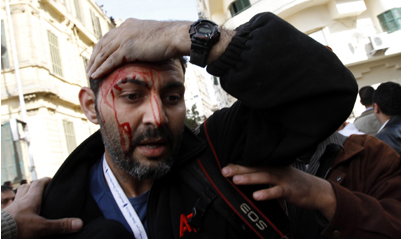Why the Journalists Matter
 On January 29, Egyptian journalist Ahmad Mohamed Mahmoud was shot in the head by a sniper as he stepped out on his office balcony to take video of an altercation between security forces and protesters. He died six days later.
On January 29, Egyptian journalist Ahmad Mohamed Mahmoud was shot in the head by a sniper as he stepped out on his office balcony to take video of an altercation between security forces and protesters. He died six days later.
Somewhere in the depths of the internet about a week ago I read a comment that posed the question, Why do we care about the journalists so much? There are more important things going on in Tahrir Square and Egyptian citizens getting hurt as bad or worse. It's their cause.
What the commenter fails to understand is that the journalists are the ones trying to spread that cause around the world.
What happened in Egypt was about democracy. One of the core tenants of democracy is free expression, both spoken and published. And violence against journalists is the single greatest danger to freedom of the press around the world.
Miklos Haraszti, the former media freedom representative for the Organization for Security and Co-operation in Europe and adjunct professor at Columbia's School of International and Public Affairs, said in a 2007 speech to the International Federation of Journalists that “Violence becomes censorship far beyond the context of the actual controversy; it will impede the press in performing its most important task in defense of democracy, because it is journalists covering human rights abuses and corruption scandals that are most punished with violence.”
While the life of each and every protester is important, when a reporter gets attacked it becomes an attack on the press as an institution: free expression and the spread of ideas. Exposing the violence displayed against journalists is just as important to the furthering of democratic values as any of the protests denouncing dictators. Without freedom of expression there cannot be democracy, no matter how many autocrats are pushed out of power.
The number of journalists attacked in protest zones continues to rise – and the violence continues to escalate. In the beginning Christiane Amanpour got her window smashed in and Anderson Cooper got hit in the head. Some people made jokes about his poor, pretty face getting messed up. Then word got out that the government was sanctioning Egyptian security forces to journalists. Things got a little scarier. By February 4th, a journalist had been shot and killed. Al Jazeera offices in Cairo had been torched. Most recently, CBS correspondent Lara Logan was reportedly beaten and sexually assaulted on the last day of protests.
Of course, the only reason that these attacks are being reported is because there are still journalists brave enough to continue reporting from Egypt despite the conditions.
Targeting journalists is a slippery slope, and what starts as street assault and detainment quickly can become arrest, brutal violence, and even murder. The number of attacks on journalists in the Middle East over the past month has done a lot to advance the cause and bring the problem to the foreground of international awareness.
But the problem is much bigger than what went on in Egypt over the past month. The Egyptian protests account for just one of the five journalist deaths that have already taken place in 2011. It's been the only one widely reported because there is enough going on in the country that journalists are staying there despite the danger.
That's not the case everywhere. The most dangerous places in the world for journalists never get reported on. That's the sick logic in violence against journalists. The most dangerous places for journalists aren't well covered for exactly that reason.
The organization Committee to Protect Journalists keeps a tally of all confirmed and suspected deaths of journalists (murdered, on dangerous assignment, and in combat) around the world. In 2010, twenty seven journalists were confirmed murdered by the CPJ. Four were in Iraq, three in Indonesia, three in Honduras, two in Mexico.
Three have been murdered already in 2011 (those don't include journalists killed while reporting on the protests in Egypt or Tunisia), the latest being Le Houng Hung, who died in Vietnam in January after being doused with chemicals and set on fire inside his home by an unidentified assailant.
There are places in the world where words can get you burned alive. That is the biggest threat to democracy. And that is why the journalists matter.
